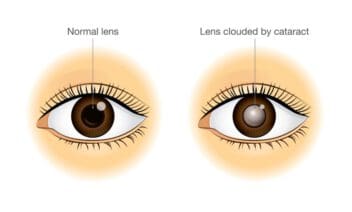Further Reading
Will Cataract Surgery Improve Night Vision?
Home / Guide to Cataract Surgery /
Last Updated:
Cataract surgery is a common and effective procedure that can help to restore your night vision.
Cataracts can make it hard to see in low-light conditions. Cataract surgery is considered very safe and low-risk, but there are some possible complications that can occur.
Table of Contents
Cataract surgery can restore your ability to see in the dark if those issues are related to the cataract and not due to other underlying eye conditions or diseases.
The surgery is a quick and simple procedure with a relatively short recovery time. Talk to your doctor to weigh the risks and benefits of cataract surgery to determine if it is right for you.
The Impact of Cataracts on Night Vision

Since cataract surgery improves vision quality and clarity, it can help you to see better in all light conditions, including at night.
Cataracts can cause light sensitivity, glares, or halos around lights, and difficulties seeing in low-light conditions. All of these issues can contribute to poor night vision. Prior to surgery, a cataract can make it extremely hard to see well at night.
You deserve clear vision. We can help.
With 135+ locations and over 2.5 million procedures performed, our board-certified eye surgeons deliver results you can trust. Your journey to better vision starts here.
Poor night vision can be one of the first signs of a developing cataract, as the cloudy lens can make your vision dimmer and blurry. It can also cause streaks and issues with seeing streetlights or headlights clearly.
One of the complications of declining night vision due to cataracts is the inability to continue to drive safely at dusk or in the dark. Cataracts can impact your daily life, and surgery is the only way to fix the issue after your day-to-day tasks are impeded.
Possible Complications
Cataract surgery is safe and effective. It is still a surgical procedure, however, so it is not completely risk-free.
Some of the possible complications of cataract surgery include the following:
| Possible Complications | Description | Frequency |
|---|---|---|
| Swelling | This is a common side effect post-surgery and usually subsides in a few days. | Common |
| Blurred Vision | Temporary blurry vision can occur after surgery but should clear up as your eye heals. | Common |
| Glares/Halos | Some people may experience glares or halos around lights. This usually diminishes over time. | Less Common |
| Eye Infection | As with any surgery, there’s a risk of infection. Your doctor will typically prescribe antibiotics to prevent this. | Rare |
| Pain | Some discomfort can be expected after surgery, but severe pain is unusual and should be reported to your doctor. | Uncommon |
| Detached Retina | This is a rare but serious complication where the retina (the light-sensitive layer at the back of the eye) detaches. | Rare |
| Bleeding in the Eye | e This is a very rare complication that can cause vision loss. | Very Rare |
| Vision Loss | Permanent vision loss is a rare but serious complication. | Very Rare |
The odds of a complication are low. The majority of cataract surgeries are successful with limited or no problems.
What to Expect After Cataract Surgery
It is important to note that if you have other vision issues, eye diseases, or complications that are not related to cataracts, cataract surgery is not going to fix these problems. The surgery replaces your cloudy lens with a clear one to improve issues that arise when trying to view the world through a “foggy” lens.

Cataract eye surgery is a very common and medically necessary procedure to remove and replace the eye’s natural lens when the vision has been clouded by a cataract. We offer laser-assisted cataract surgery and lifestyle lenses as options for our patients.
Learn More
Cataract surgery is a same-day procedure often done in an office or clinic setting. It is a quick operation. The doctor will give you an eye patch to wear at night and eye drops to place in your eye to help it heal. You will need to have someone drive you home after the surgery.
You will often be able to see clearly within a few hours of the surgery. It can take a month to six weeks for your vision to completely regulate. During this time, you will not be able to wear contacts. Typically, you will need to wear prescription eyeglasses up until this point to let your eyes breathe and continue to heal.
Be careful not to rub your eyes or get soap in them during the healing time. It is also important to protect your eyes from the sun and environmental elements.
Some pain, swelling, redness, blurry vision, and tearing are common after cataract surgery and should go away within a few days or weeks. You will likely need to take a few days off work, get help around the house, and have someone drive you around while your vision continues to improve after surgery.
Overall, cataract surgery can clear up blurry vision and improve your ability to see at night. The operation is minimally invasive, and most people are happy with the results of the procedure.
Talk to your doctor about the risks and rewards of cataract surgery for you. Be sure to follow all of their instructions after surgery to minimize your risk for complications.
You deserve clear vision. We can help.
With 135+ locations and over 2.5 million procedures performed, our board-certified eye surgeons deliver results you can trust. Your journey to better vision starts here.
References
- Cataracts. (August 2019). National Eye Institute (NEI).
- What Are Cataracts? (October 2020). American Academy of Ophthalmology (AAO).
- Night Vision. (December 2019). American Academy of Ophthalmology (AAO).
- Cataract Surgery. (September 2020). American Academy of Ophthalmology (AAO).
- Driving When You Have Cataracts. National Highway Traffic Safety Administration (NHTSA).
- Recovery Cataract Surgery. (December 2017). NHS.
This content is for informational purposes only. It may have been reviewed by a licensed physician, but is not intended to serve as a substitute for professional medical advice. Always consult your healthcare provider with any health concerns. For more, read our Privacy Policy and Editorial Policy.